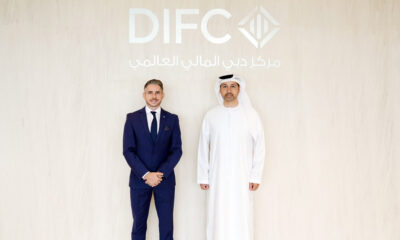News
The First Bitcoin ETFs Have Been Approved By US Regulators
The move takes cryptocurrencies a step further towards full Wall Street integration.

Fifteen years following the mining of the genesis block, the US Securities and Exchange Commission (SEC) has granted approval for Bitcoin exchange-traded funds (ETFs). The ruling marks a significant milestone in Bitcoin’s integration into the traditional financial system it once aimed to challenge. The decision paves the way for the availability of 11 spot Bitcoin ETFs to investors, including those offered by Grayscale, Fidelity, and BlackRock, among others.
Gary Gensler, the SEC chairman, clarified the approval by stating, “While we approved the listing and trading of certain spot bitcoin ETP shares today, we did not approve or endorse Bitcoin. Investors should remain cautious about the myriad risks associated with bitcoin and products whose value is tied to crypto”.
For a decade, the SEC consistently rejected proposals for Bitcoin ETFs, which essentially function like bundles of assets, similar to mutual funds but tradable on exchanges. The commission regularly cited investment safety concerns, but now approval has been granted, new investors won’t need to set up individual wallets to trade Bitcoin, making it more accessible.
This development has generated considerable excitement among cryptocurrency enthusiasts, as ETF-issuing companies will be required to acquire corresponding amounts of Bitcoin to back their funds. Interestingly, the immediate impact on Bitcoin’s price was minimal, but in the long run, the introduction of a Bitcoin ETF is anticipated to facilitate the entry of traditional institutional investors into the cryptocurrency realm. This could include pension and insurance funds, leading to increased demand for Bitcoin.
Also Read: Non-Fungible Tokens: A Beginner’s Guide To Getting Started With NFTs
Until now, investors seeking exposure to cryptocurrency often invested in shares of crypto-centric companies such as Coinbase and MicroStrategy, the latter holding over $8 billion in Bitcoin as of January. The emergence of a Bitcoin ETF could potentially affect the valuation of these companies.
It’s important to mention that a false announcement briefly circulated on the SEC’s Twitter/X account on Tuesday, falsely claiming approval of Bitcoin ETFs, which caused some confusion.
News
Alienware Just Announced Six New Gaming Monitors
The new models include three QD-OLED and three budget-friendly QHD options, expanding the company’s lineup for all gamers.

Alienware has just updated its gaming monitor lineup with six new additions, including the highly anticipated Alienware 27 4K QD-OLED Monitor. The latest wave of releases is set to reach more gamers than ever, offering high-end QD-OLED displays alongside more budget-friendly options.
The latest displays clearly show that the company is doubling down on QD-OLED with three new models sporting the technology. A redesigned Alienware 34 Ultra-Wide QD-OLED Monitor is also making a return, further refining what is already a fan-favorite display.
A Unified Design: The AW30 Aesthetic
All six monitors feature Alienware’s new AW30 design language, first introduced at CES. The AW30 aesthetic brings a futuristic, minimalist look that unites the entire lineup under a cohesive visual identity.
Pushing QD-OLED Even Further
The refreshed Alienware 34 Ultra-Wide QD-OLED Monitor (AW3425DW) builds on its predecessor’s success with a 240Hz refresh rate (up from 175Hz) and HDMI 2.1 FRL support. It also gains G-SYNC Compatible certification alongside AMD FreeSync Premium Pro and VESA AdaptiveSync, ensuring ultra-smooth performance. With a WQHD (3440×1440) resolution and an 1800R curve, this display enhances immersion for both gaming and cinematic experiences.
For those who crave speed, the Alienware 27 280Hz QD-OLED Monitor (AW2725D) pairs a high refresh rate with QHD resolution, balancing sharp visuals with ultra-smooth gameplay. Meanwhile, the Alienware 27 4K QD-OLED Monitor (AW2725Q) delivers stunning clarity with an industry-leading pixel density of 166 PPI, making it the sharpest OLED or QD-OLED monitor available.
Also Read: Infinite Reality Acquires Napster In $207 Million Deal
Worried about OLED burn-in? Alienware’s entire QD-OLED lineup comes with a three-year limited warranty covering burn-in concerns, offering peace of mind for gamers investing in these high-end displays.
Bringing QHD To A Wider Audience
Alongside QD-OLED, Alienware is also releasing three new QHD gaming monitors aimed at more price-conscious gamers. The Alienware 34 Gaming Monitor (AW3425DWM), Alienware 32 Gaming Monitor (AW3225DM), and Alienware 27 Gaming Monitor (AW2725DM) provide a range of sizes and formats to suit different preferences:
- The Alienware 34 Gaming Monitor (AW3425DWM): An ultrawide (WQHD) option for a panoramic, immersive experience.
- The Alienware 32 Gaming Monitor (AW3225DM): A standard 16:9 panel for a traditional but expansive desktop setup.
- The Alienware 27 Gaming Monitor (AW2725DM): A 27” display offering the same performance in a more compact form factor.
All three gaming monitors feature a fast 180 Hz refresh rate, a 1ms gray-to-gray response time, and support for NVIDIA G-SYNC, AMD FreeSync, and VESA AdaptiveSync to eliminate screen tearing. Additionally, with 95% DCI-P3 color coverage and VESA DisplayHDR400 certification, these displays deliver vibrant colors and high dynamic range for lifelike visuals.
-

 News3 weeks ago
News3 weeks agoSpace42 & Cobham Satcom Launch New Satellite Broadband Terminal
-

 News3 weeks ago
News3 weeks agoRipple Gains DFSA License To Offer Crypto Payments In Dubai
-

 News2 weeks ago
News2 weeks agoAre You Ready For Hong Kong’s InnoEX & Electronics Fair?
-

 News2 weeks ago
News2 weeks agoWizz Air Abu Dhabi Adds Beirut Flights Amid Tourism Revival

















